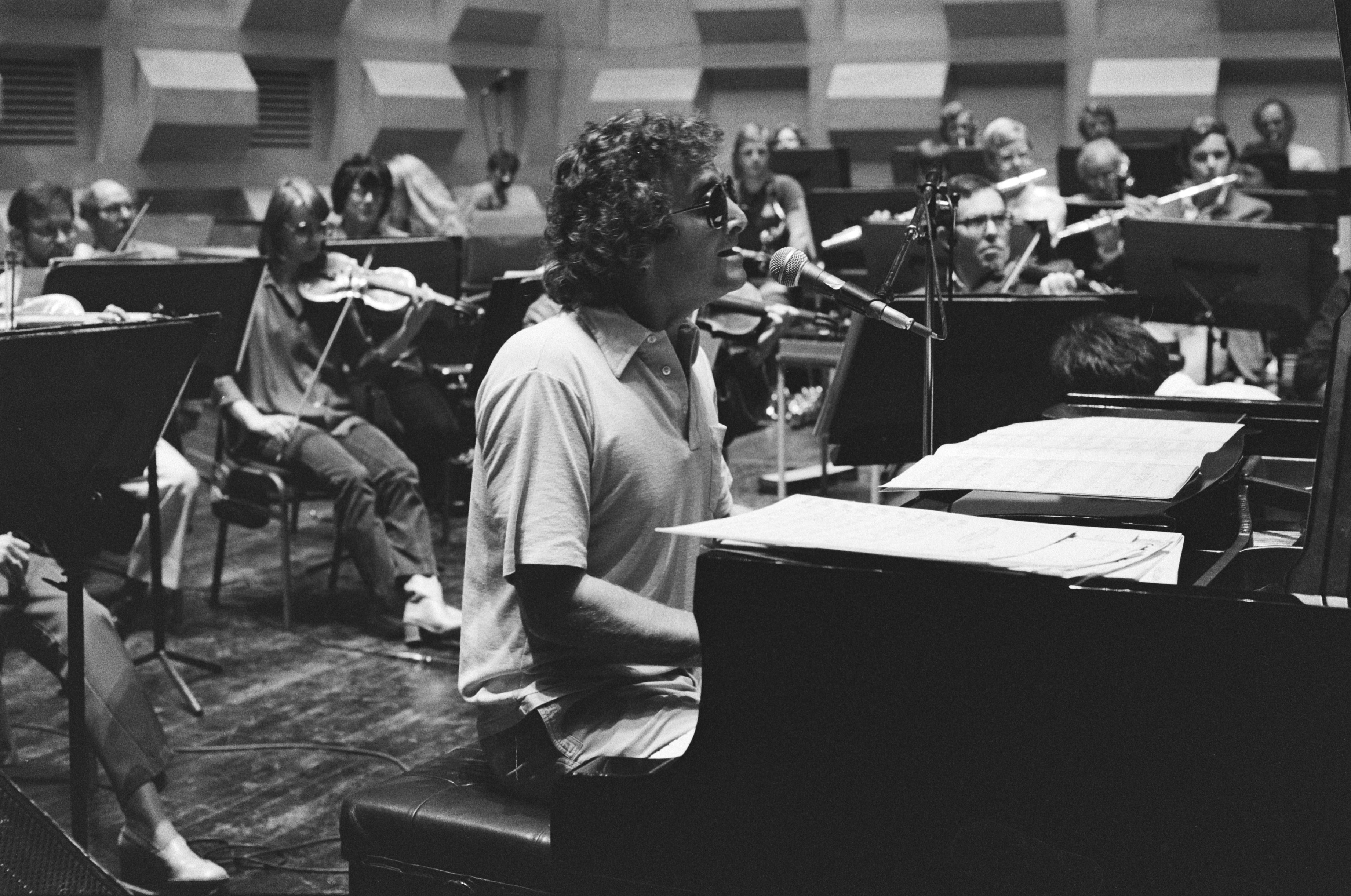|
I Love L.A.
"I Love L.A." is a song by Randy Newman. It was originally released on his 1983 album '' Trouble in Paradise''. The song is about Los Angeles, California, and its hook is its title, repeated, each time followed by an enthusiastic crowd cheering, "We love it!" Writing and recording Following the release of his sixth album ''Born Again'' (1979), Newman heavily procrastinated writing songs for a follow-up album, and spent a good portion of the next four years relaxing at home with his family. Newman jokingly noted that because he often lounged by the pool, the gardener had to water around him. To counter this lackadaisical lifestyle, Newman rented a recording studio in Los Angeles in 1983, which did not have any telephones to distract him. In this studio Newman recorded a song called "Something to Sing About", in which the narrator arrogantly boasts about the suburban opulence around him. Album producer Lenny Waronker disliked "Something to Sing About" and opted not to include it on ... [...More Info...] [...Related Items...] OR: [Wikipedia] [Google] [Baidu] |
Randy Newman
Randall Stuart Newman (born November 28, 1943) is an American singer-songwriter, arranger, composer, and pianist known for his Southern American English, Southern-accented singing style, early Americana (music), Americana-influenced songs (often with mordant or satirical lyrics), and various film scores. His best-known songs as a recording artist are "Short People" (1977), "I Love L.A." (1983), and "You've Got a Friend in Me" (1995) with Lyle Lovett, while other artists have enjoyed more success with cover versions of his "Mama Told Me Not to Come" (1966), "I Think It's Going to Rain Today" (1968) and "You Can Leave Your Hat On" (1972). Born in Los Angeles to an extended family of Hollywood film composers, Newman began his songwriting career at the age of 17, penning hits for acts such as the Fleetwoods, Cilla Black, Gene Pitney, and the Alan Price Set. In 1968, he made his formal debut as a solo artist with the album ''Randy Newman (album), Randy Newman'', produced by Lenny Waro ... [...More Info...] [...Related Items...] OR: [Wikipedia] [Google] [Baidu] |
Mixing Engineer
A mixing engineer (or simply mix engineer) is responsible for combining ("mixing") different sonic elements of an auditory piece into a complete rendition (also known as "final mix" or "mixdown"), whether in music, film, or any other content of auditory nature. The finished piece, recorded or live, must achieve a good balance of properties, such as volume, pan positioning, and other effects, while resolving any arising frequency conflicts from various sound sources. These sound sources can comprise the different musical instruments or vocals in a band or orchestra, dialogue or foley in a film, and more. The best mixing professionals typically have many years of experience and training with audio equipment, which has enabled them to master their craft. A mixing engineer occupies a space between artist and scientist, whose skills are used to assess the harmonic structure of sound to enable them to fashion desired timbres. Their work is found in all modern music, though ease of ... [...More Info...] [...Related Items...] OR: [Wikipedia] [Google] [Baidu] |
Name-dropping
Name-dropping (or name-checking or a shout-out) is the practice of naming or alluding to important people and institutions within a conversation,. story, song, online identity, or other communication. The term often connotes an attempt to impress others; it is usually regarded negatively, and under certain circumstances may constitute a breach of professional ethics. When used as part of a logical argument it can be an example of the false authority fallacy. Purposes Name-dropping is used to position oneself within a social hierarchy. It is often used to create a sense of superiority by raising one's status. By implying (or directly asserting) a connection to people of high status, the name-dropper hopes to raise their own social status to a level closer to that of those whose names they have dropped, and thus elevate themselves above, or into, present company. Name-dropping can also be used to identify people with a common bond. By indicating the names of people one knows, one ma ... [...More Info...] [...Related Items...] OR: [Wikipedia] [Google] [Baidu] |
The Beach Boys
The Beach Boys are an American Rock music, rock band that formed in Hawthorne, California, in 1961. The group's original lineup consisted of brothers Brian Wilson, Brian, Dennis Wilson, Dennis, and Carl Wilson, their cousin Mike Love, and friend Al Jardine. Distinguished by their vocal harmony, vocal harmonies, adolescent-themed lyrics, and musical ingenuity, they are one of the most influential acts of the rock era. They drew on the music of traditional pop, older pop vocal groups, 1950s rock and roll, and black R&B to create their unique sound. Under Brian's direction, they often incorporated classical music, classical or jazz elements and Recording studio as an instrument, unconventional recording techniques in innovative ways. The Beach Boys began as a garage band, managed by the Wilsons' father Murry Wilson, Murry, with Brian serving as composer, arranger, producer, and ''de facto'' leader. In 1963, they enjoyed their first national hit with "Surfin' U.S.A.", beginning a ... [...More Info...] [...Related Items...] OR: [Wikipedia] [Google] [Baidu] |
Pop Rock
Pop rock (also typeset as pop/rock) is a fusion genre with an emphasis on professional songwriting and recording craft, and less emphasis on attitude than rock music. Originating in the late 1950s as an alternative to normal rock and roll, early pop rock was influenced by the beat, arrangements, and original style of rock and roll (and sometimes doo-wop). It may be viewed as a distinct genre field rather than music that overlaps with pop and rock. The detractors of pop rock often deride it as a slick, commercial product and less authentic than rock music. Characteristics and etymology Much pop and rock music has been very similar in sound, instrumentation and even lyrical content. The terms "pop rock" and "power pop" have been used to describe more commercially successful music that uses elements from, or the form of, rock music. Writer Johan Fornas views pop/rock as "one single, continuous genre field", rather than distinct categories. To the authors Larry Starr and Chri ... [...More Info...] [...Related Items...] OR: [Wikipedia] [Google] [Baidu] |
Eskimo
Eskimo () is an exonym used to refer to two closely related Indigenous peoples: the Inuit (including the Alaska Native Iñupiat, the Greenlandic Inuit, and the Canadian Inuit) and the Yupik peoples, Yupik (or Siberian Yupik, Yuit) of eastern Siberia and Alaska. A related third group, the Aleut, which inhabit the Aleutian Islands, are generally excluded from the definition of Eskimo. The three groups share a relatively recent common ancestor, and speak related languages belonging to the Eskaleut languages, Eskaleut language family. These circumpolar peoples have traditionally inhabited the Arctic and subarctic regions from eastern Siberia (Russia) to Alaska (United States), Northern Canada, Nunavik, Nunatsiavut, and Greenland. Many Inuit, Yupik, Aleut, and other individuals consider the term ''Eskimo'', which is of a disputed etymology, to be unacceptable and even pejorative. Eskimo continues to be used within a historical, linguistic, archaeological, and cultural context. The g ... [...More Info...] [...Related Items...] OR: [Wikipedia] [Google] [Baidu] |
Rodgers And Hart
Rodgers and Hart were an American songwriting partnership between composer Richard Rodgers (1902–1979) and the lyricist Lorenz Hart (1895–1943). They worked together on 28 stage musicals and more than 500 songs from 1919 until Hart's death in 1943.Rodgers and Hart Biography Guide to Musical Theatre, accessed April 5, 2009 History Richard Rodgers and Lorenz Hart were introduced in 1919; Rodgers was still in high school while Hart had already graduated from . Their first collaboration together was at Columbia, and resulted in the 1920 |
Verse (music)
Song structure is the arrangement of a song, and is a part of the songwriting process. It is typically sectional, which uses repeating forms in songs. Common forms include bar form, 32-bar form, verse–chorus form, ternary form, strophic form, and the 12-bar blues. Popular music songs traditionally use the same music for each verse or stanza of lyrics (as opposed to songs that are "through-composed"—an approach used in classical music art songs). Pop and traditional forms can be used even with songs that have structural differences in melodies. The most common format in modern popular music is introduction (intro), verse, pre-chorus, chorus, verse, pre-chorus, chorus, bridge, and chorus. In rock music styles, notably heavy metal music, there is usually one or more guitar solos in the song, often found after the middle chorus part. In pop music, there may be a guitar solo, or a solo performed with another instrument such as a synthesizer or a saxophone. The foundation of popular ... [...More Info...] [...Related Items...] OR: [Wikipedia] [Google] [Baidu] |
AllMusic
AllMusic (previously known as All Music Guide and AMG) is an American online music database. It catalogs more than three million album entries and 30 million tracks, as well as information on musicians and bands. Initiated in 1991, the database was first made available on the Internet in 1994. AllMusic is owned by RhythmOne. History AllMusic was launched as ''All Music Guide'' by Michael Erlewine, a "compulsive archivist, noted astrologer, Buddhist scholar and musician". He became interested in using computers for his astrological work in the mid-1970s and founded a software company, Matrix, in 1977. In the early 1990s, as CDs replaced LPs as the dominant format for recorded music, Erlewine purchased what he thought was a CD of early recordings by Little Richard. After buying it he discovered it was a "flaccid latter-day rehash". Frustrated with the labeling, he researched using metadata to create a music guide. In 1990, in Big Rapids, Michigan, he founded ''All Music Guide' ... [...More Info...] [...Related Items...] OR: [Wikipedia] [Google] [Baidu] |
Rhythm Guitar
In music performances, rhythm guitar is a technique and role that performs a combination of two functions: to provide all or part of the rhythmic pulse in conjunction with other instruments from the rhythm section (e.g., drum kit, bass guitar); and to provide all or part of the harmony, i.e. the chords from a song's chord progression, where a chord is a group of notes played together. Therefore, the basic technique of rhythm guitar is to hold down a series of chords with the fretting hand while strumming or fingerpicking rhythmically with the other hand. More developed rhythm techniques include arpeggios, damping, riffs, chord solos, and complex strums. In ensembles or bands playing within the acoustic, country, blues, rock or metal genres (among others), a guitarist playing the rhythm part of a composition plays the role of supporting the melodic lines and improvised solos played on the lead instrument or instruments, be they strings, wind, brass, keyboard or even percus ... [...More Info...] [...Related Items...] OR: [Wikipedia] [Google] [Baidu] |
Waddy Wachtel
Robert "Waddy" Wachtel (born May 24, 1947) is an American musician, composer and record producer, most notable for his guitar work. Wachtel has worked as session musician for other artists such as Linda Ronstadt, Stevie Nicks, Kim Carnes, Randy Newman, Keith Richards, The Rolling Stones (lead guitar on "Saint of Me"), Jon Bon Jovi, James Taylor, Iggy Pop, Warren Zevon, Bryan Ferry, Michael Sweet, Jackson Browne, and Andrew Gold, both in the studio and live. Early years Wachtel was born May 24, 1947, in Jackson Heights in the New York City borough of Queens. At about age 9–10, Wachtel began to learn to play the guitar, taking lessons with teacher Gene Dell (who insisted that he learn to play right-handed despite being naturally left-handed) until about age 14. At that age, he says, he began writing songs. Wachtel also studied with Rudolph Schramm, who was the head of the NBC staff orchestra and went on to teach music at Carnegie Hall. Schramm tried to get Wachtel to take piano ... [...More Info...] [...Related Items...] OR: [Wikipedia] [Google] [Baidu] |

.png)




